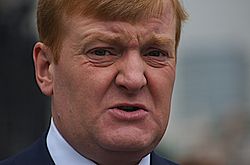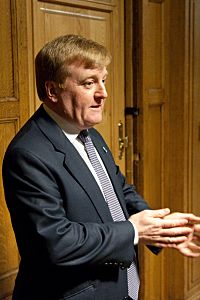Charles Kennedy facts for kids
Quick facts for kids
Charles Kennedy
|
|
|---|---|
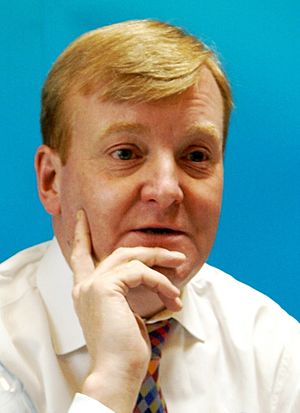
Kennedy in 2006
|
|
| Leader of the Liberal Democrats | |
| In office 9 August 1999 – 7 January 2006 |
|
| Deputy |
|
| President |
|
| Preceded by | |
| Succeeded by | |
| Liberal Democrat Leader of the House of Commons | |
| In office 1 May 1997 – 9 August 1999 |
|
| Leader | Paddy Ashdown |
| Preceded by | Office established |
| Succeeded by | Alan Beith |
| President of the Liberal Democrats | |
| In office 1 January 1991 – 31 December 1994 |
|
| Leader | Paddy Ashdown |
| Preceded by | Ian Wrigglesworth |
| Succeeded by | Robert Maclennan |
| Member of Parliament for Ross, Skye and Lochaber Ross, Skye and Inverness West (1997–2005) Ross, Cromarty and Skye (1983–1997) |
|
| In office 9 June 1983 – 30 March 2015 |
|
| Preceded by | Constituency established |
| Succeeded by | Ian Blackford |
| Personal details | |
| Born |
Charles Peter Kennedy
25 November 1959 Inverness, Scotland |
| Died | 1 June 2015 (aged 55) Fort William, Scotland |
| Nationality | British |
| Political party | Liberal Democrats (1988–2015) |
| Other political affiliations |
Social Democratic Party (1981–1988) Labour (1974–1981) |
| Spouse |
Sarah Gurling
(m. 2002; div. 2010) |
| Children | 1 |
| Alma mater | University of Glasgow Indiana University |
Charles Peter Kennedy (born 25 November 1959 – died 1 June 2015) was a British politician. He was a member of the Liberal Democrats party. He served as the Leader of the Liberal Democrats from 1999 to 2006. He was also a Member of Parliament (MP) for the area of Ross, Skye and Lochaber from 1983 until 2015.
Kennedy was first elected to the House of Commons in 1983. After two political parties, the SDP and Liberals, joined together, he became the president of the Liberal Democrats. Later, he became the leader of the Liberal Democrats after Paddy Ashdown stepped down. He led the party in the 2001 and 2005 general elections. During his time as leader, the party gained more seats in the House of Commons than they had since 1923. He also led his party in opposing the Iraq War. He was known for being a friendly and engaging speaker. He often appeared on television during his time as leader.
Towards the end of his leadership, there were discussions within his party about his position. He decided to step down as leader in January 2006. After Menzies Campbell became the new leader, Kennedy continued to serve as an MP. He voted against the formation of the Cameron–Clegg coalition government. He passed away in 2015, shortly after losing his seat in the House of Commons.
Contents
Early Life and Education
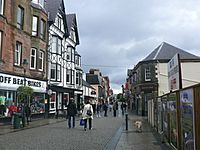
Charles Kennedy was born on 25 November 1959 in Inverness, a town in the Scottish Highlands. His parents were Mary and Ian Kennedy. He grew up in a small cottage in the Highlands. He had a Roman Catholic upbringing. He went to Lochaber High School in Fort William.
After school, he studied Politics and Philosophy at the University of Glasgow. Kennedy became interested in politics during his university years. He joined the SDP party and the Dialectic Society. From 1980 to 1981, he was the President of the Glasgow University Union. In 1982, he won a major debating competition called the Observer Mace.
After graduating in 1982, Kennedy worked as a journalist for BBC Scotland. He later received a special scholarship called the Fulbright Fellowship. This allowed him to do research at Indiana University in the United States.
Start of Political Career
At the age of 15, Charles Kennedy joined the Labour Party. In 1981, he joined the new Social Democratic Party (SDP). Two years later, in 1983, Kennedy was chosen by the SDP to run for a seat in Scotland. This seat was called Ross, Cromarty and Skye. The seat was held by the Conservative politician Hamish Gray.
In the 1983 general election, Kennedy won the seat. He received 13,528 votes, which was 38.5% of the total. He won by 1,704 votes, defeating Hamish Gray. At 23 years old, he became the youngest Member of Parliament in the House of Commons.
He served on the Social Services committee from 1985 to 1987. He kept his seat in the 1987 general election. From 1987 to 1989, he served on the committee for televising Parliament.
Kennedy was the first of five SDP MPs to support merging his party with the Liberal Party. These two parties had been working together as the SDP–Liberal Alliance. The merger happened in 1988, forming the Social and Liberal Democratic Party, which was later renamed the Liberal Democrats. Kennedy strongly supported this merger.
In 1989, Kennedy became a spokesperson for health for the Liberal Democrats. He kept his seat in the 1992 general election. From 1992 to 1997, he was the party's spokesperson for foreign affairs. He was re-elected in the 1997 general election. From 1997 to 1999, he served on the Standards and Privileges committee.
He was also the president of the Liberal Democrats from 1990 to 1994. From 1997 to 1999, he was the Liberal Democrat spokesperson for the Leader of the House of Commons.
Leader of the Liberal Democrats
Charles Kennedy was chosen as the leader of the Liberal Democrats on 9 August 1999. This happened after Paddy Ashdown retired. Kennedy won 57% of the votes, beating other candidates like Simon Hughes. In October of the same year, he became a member of the Privy Council.
Kennedy was known for his friendly and easy-going leadership style. Some people called him "Chatshow Charlie" because he often appeared on TV shows like Have I Got News for You.
In Kennedy's first election as leader, the 2001 general election, the Liberal Democrats won 52 seats. They received 18.3% of the votes. This was an improvement of six seats compared to the 1997 election. Kennedy led his party in opposing the Iraq War. All Liberal Democrat MPs voted against or did not vote on the decision to invade Iraq. This made them the largest British party to oppose the war.
2005 General Election
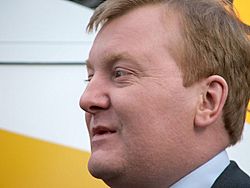
In his last general election as leader in May 2005, Kennedy continued a strategy of targeting seats held by important Conservative MPs. The Liberal Democrats also hoped to win seats from the Labour party. They especially wanted to attract Labour voters who were unhappy about the Iraq War, which Kennedy's party had opposed.
Before the election, many expected the Liberal Democrats to win up to 100 seats. They hoped to be very close to the Conservatives in terms of seats and votes. However, they won 62 seats and 22.1% of the vote. This was their highest number of seats since their earlier party, the Liberal Party, won 158 seats in 1923.
The Liberal Democrats lost five seats to the Conservatives but won three from them. They managed to unseat Shadow Education Secretary Tim Collins. However, they did not unseat other leading Conservatives like Oliver Letwin or Theresa May. The strategy of targeting top Conservatives was generally seen as unsuccessful. They won twelve seats from Labour but lost one. They also regained a seat from the Welsh party Plaid Cymru.
Kennedy said the Liberal Democrats, with their 62 seats, were the "national party of the future." However, after the election, some people criticized Kennedy's leadership. They felt the party could have done even better, especially since the main opposition Conservative Party was not very strong.
Leadership Change
After David Cameron became the leader of the Conservative Party in December 2005, some senior Liberal Democrats reportedly told Kennedy he needed to improve or step down. There was much talk about the leadership of the Liberal Democrats in late 2005.
On 6 January 2006, Kennedy announced that he would call a leadership contest. He said he would stand in this contest to resolve questions about his leadership. However, on 7 January 2006, Kennedy held another press conference. He announced that he would not continue as leader because he felt he did not have enough support from the MPs in his party. He said he would step down "with immediate effect." Menzies Campbell became the temporary leader until a new leader was chosen. Kennedy's time as leader lasted for almost six years and five months.
Later Political Career
As a Backbencher
After stepping down as party leader, Kennedy continued to serve as an MP. His first major political activity was campaigning in the Dunfermline and West Fife by-election. The Liberal Democrats won this election, taking the seat from Labour.
On 22 June 2006, Kennedy appeared on the BBC's Question Time. This was his first national media appearance after resigning as leader. He was asked about a possible return as leader, which he did not completely rule out.
On 4 August 2006, he hosted a TV show on Channel 4. It was about how voters felt increasingly unhappy with the main political parties. He also wrote an article about these issues for The Guardian.
When Menzies Campbell resigned as Liberal Democrat leader on 15 October 2007, Kennedy said it was "highly unlikely" he would try to become leader again. However, he did not completely rule it out.
Conservative–Liberal Democrat Coalition (2010–2015)
In the 2010 general election, Kennedy was re-elected to Parliament. He won with a large majority of 13,070 votes.
Kennedy voted against the Conservative–Liberal Democrat coalition government in May 2010. He explained in an article that he did not believe staying in opposition was a "do nothing" approach. He also warned about the risks of his party becoming too similar to the Conservatives.
In August 2010, there were reports that Kennedy might leave the Liberal Democrats to join Labour. This was said to be in protest against his party's role in government spending cuts. However, the Liberal Democrats quickly denied these reports.
Kennedy played a part in the Better Together campaign. This campaign supported Scotland remaining part of the United Kingdom during the 2014 Scottish independence referendum. In March 2014, it was reported that Kennedy had criticized Labour's strategy in the referendum campaign. He said that Better Together needed to think about its long-term impact.
Kennedy lost his seat in the 2015 general election. He was defeated by Ian Blackford of the Scottish National Party. This happened as the Liberal Democrats lost 49 seats across the country.
Rector of University of Glasgow
In February 2008, Charles Kennedy was elected Rector of the University of Glasgow. He officially took office on 10 April 2008, taking over from Mordechai Vanunu. He won the election with 46% of the votes. He was supported by various student groups. He was re-elected in February 2011, easily defeating another candidate, the writer A. L. Kennedy. He served as rector for six years until Edward Snowden was elected in February 2014.
Death
Charles Kennedy passed away on the evening of 1 June 2015 at his home in Fort William. He was 55 years old. His death was announced early the next day. The police stated that his death was "sudden and non-suspicious."
A funeral service was held on 12 June at St John's Roman Catholic Church in Caol, near Fort William. His body was buried at his family's cemetery in Clunes. A service of thanksgiving was held at the University of Glasgow on 18 June. The university announced that it would raise money to name a teaching area in his memory. A memorial service also took place in St George's Cathedral, Southwark, London, on 3 November.
Personal Life
In July 2002, Charles Kennedy married Sarah Gurling. She was the sister of his friend, James Gurling. They had one son, Donald, who was born in 2005. On 9 August 2010, it was announced that Kennedy and his wife were separating. Their divorce was finalized on 9 December 2010.
Kennedy's father, Ian, passed away in April 2015, just two months before Charles's death. Charles was very close to his father.
Electoral History
| Date of election | Constituency | Party | Votes | % of votes | Result | Ref | |
|---|---|---|---|---|---|---|---|
| 1983 general election | Ross, Cromarty and Skye | Social Democratic Party | 13,528 | 38.5 | Elected | ||
| 1987 general election | Ross, Cromarty and Skye | Social Democratic Party | 18,809 | 49.4 | Re-Elected | ||
| 1992 general election | Ross, Cromarty and Skye | Liberal Democrats | 17,066 | 41.6 | Re-Elected | ||
| 1997 general election | Ross, Skye and Inverness West | Liberal Democrats | 15,472 | 38.7 | Re-Elected | ||
| 2001 general election | Ross, Skye and Inverness West | Liberal Democrats | 18,832 | 54.1 | Re-Elected | ||
| 2005 general election | Ross, Skye and Lochaber | Liberal Democrats | 19,100 | 58.7 | Re-Elected | ||
| 2010 general election | Ross, Skye and Lochaber | Liberal Democrats | 18,335 | 52.6 | Re-Elected | ||
| 2015 general election | Ross, Skye and Lochaber | Liberal Democrats | 14,995 | 35.9 | Unseated | ||
Images for kids
See also
 In Spanish: Charles Kennedy para niños
In Spanish: Charles Kennedy para niños


